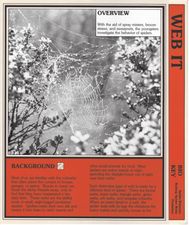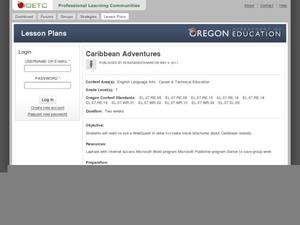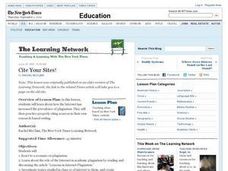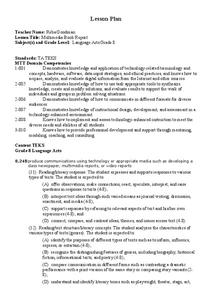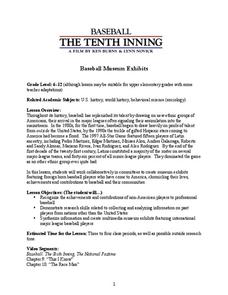Curated OER
Using Word Processing to Create Graphic Organizers
Students create a graphic organizer and instructional rubric using word processing software. They conduct Internet research at the History Alive website, and publish an essay.
Curated OER
Pass It Down
Students in varying grades work cooperatively to create a living museum of items that have been "passed down" through generations. They give a brief oral presentation showing their object (or a picture of it) and describing its history...
Curated OER
Reading With Fluency And Expression
Practice makes perfect, and this lesson provides a rubric to prove it! To improve their ability to read with fluency and expression, readers listen to a series of online stories in order to hear how a well-read story should sound. They...
Curated OER
Dream Career Presentation, Part 2
Fifth graders brainstorm a list of characteristics people have when they are happy with their career. In groups, they review their material from the previous lesson and share their information with the class in the form of presentations....
Curated OER
Web It!
Looking for a way to bring prewriting into your informative writing unit? Use this lesson to reinforce writing skills in your eighth grade language arts class. Young writers use a web graphic organizer as a prewriting tool for expository...
Curated OER
Teaching Summarization
Examine the process of summarizing a piece of text using the book So You Want to Be a President? Kids review the definitions for main idea, topic sentences, superordinate terms, and supporting details. Next, they work in small groups to...
Curated OER
Retelling Information
This scripted lesson suggests using the journalist’s five W’s (who, what, when, where, why) to teach readers how to summarize a story and to how to distinguish between significant and supporting details. A template and rubric are...
Curated OER
Caribbean Adventures: Research and Desktop Publishing
If you want an interesting way to teach about the Caribbean that incorporates technology, this might be your answer. Class members conduct a WebQuest to gather information about Caribbean islands and create a travel brochure using...
Curated OER
The assassination of the Archduke: Exploring Perspectives
Use political cartoons for a multiple-perspectives strategy, as pupils learn about the assassination of Archduke Franz Ferdinand. After an anticipatory discussion, they are split into 2 groups. The class reads a primary source account...
Curated OER
Lots of Lessons from Aesop
Aesop’s Fables offer young learners an opportunity to study figurative language. After reviewing theme, simile, alliteration, and metaphor, model for your pupils how to identify examples of these devices in the fable. Class members then...
Curated OER
Listening To a Guest Speaker
Pupils review the main points of note-taking to summarize the content of a formal or informal spoken presentation. They hear a guest speaker talk about a pre-arranged topic and take notes during the presentation. Next, they write a...
Curated OER
Sequences and Series
Students use Excel Database to explore sequences and series. They examine how to calculate term positions and Sigma Notations. Students use Excel to calculate the values and they print the pages for grading.
Curated OER
Writing: Narrative, Expository, Persuasive, and Descriptive
If you are interested in having a basic framework for teaching expository, narrative, persuasive, and descriptive writing, this resource may help; however, you will have to find information on the different forms of writing to share with...
Curated OER
Sensational Colors
In this writing worksheet, students prepare to write a poem about a color they have chosen. First students think about descriptive words pertaining to their color and the 5 senses. The students then write the poem and evaluate it using a...
Curated OER
Cite Your Sites
What information would you find in an almanac that you would not find in an atlas? What is the difference between a dictionary and a thesaurus? Using a Cite Your Sites worksheet on which they record their observations, groups participate...
Curated OER
Multimedia Book Report
Young readers plan and draft a book report focusing on the five key components of a novel: plot, character, setting, conflict, and theme. After completing a story board, pupils then prepare a PowerPoint book report that is shown to the...
Curated OER
Language Arts: Plot Summary
Eighth graders implement plot summary organizers to identify essential elements such as conflict and resolution in literature. In pairs, they retell fairy tales to each other and complete plot summaries about them. As students read new...
Curated OER
Beginning and Ending Sounds - Lesson 1 of 2
Stamp, slap, and clap! Emergent readers demonstrate their awareness of the initial, medial vowel, and final sounds in spoken, short vowel, single-syllable words with a stamp/slap/clap activity. After identifying the letters and sounds of...
PBS
Baseball: The Tenth Inning
The intent of this resource is to explore Latin American accomplishments in baseball, recognizing the changes in demographics of players over the last century. Social studies classes begin with a discussion and brainstorm surrounding...
Curated OER
How to DO Just About Anything
Learners discover how to use a digital camera and how to make a PowerPoint presentation. They practice good listening skills and hear how to make a "Supa Dupa Egg." They take notes and use them to create an effective, step-by-step...
Foreign Policy Research Institute
The People's Republic of China
This resource provides a nice framework for students to explore the perceived shift in China's policymaking from the idealogical to the practical. While this lesson includes some dated materials (2006 is the most recent news headline)...
Foreign Policy Research Institute
Islam: A Bottom-Up Approach
Islam is often discussed socio-politically rather than spiritually. Here, students read about this religion from primary and secondary sources including the Quran and a world religions book. They learn key terms in the context of the...
Foreign Policy Research Institute
Propaganda - 9/11 and the War on Terrorism
Propaganda is an important topic that most high school social studies teachers address. Here, learners compare and contrast methods of public persuasion during WWII with those used in the contemporary War on Terror. Research, discussion,...
Foreign Policy Research Institute
A Geography Lesson
Fewer and fewer people have a strong grasp of world geography, but this activity helps students understand geopolitics by creating their own original historical map. The activity requires selecting a country from the list provided,...
Other popular searches
- Grading Rubrics for Poetry
- Peer Grading Rubrics
- Writing Grading Rubrics
- Presentation Grading Rubrics
- Science Grading Rubrics
- Lab Grading Rubrics
- Peer Grading Rubrics Group
- Grading Rubrics Business






